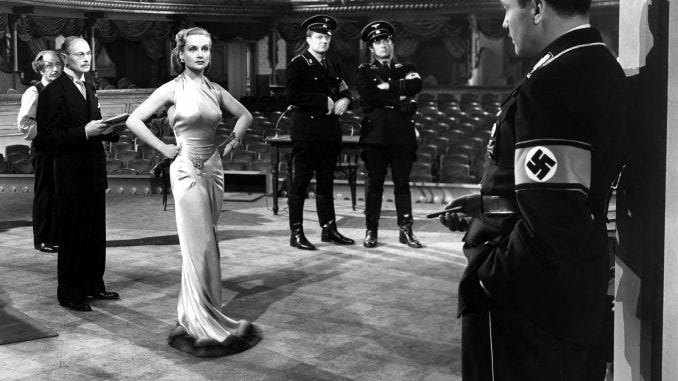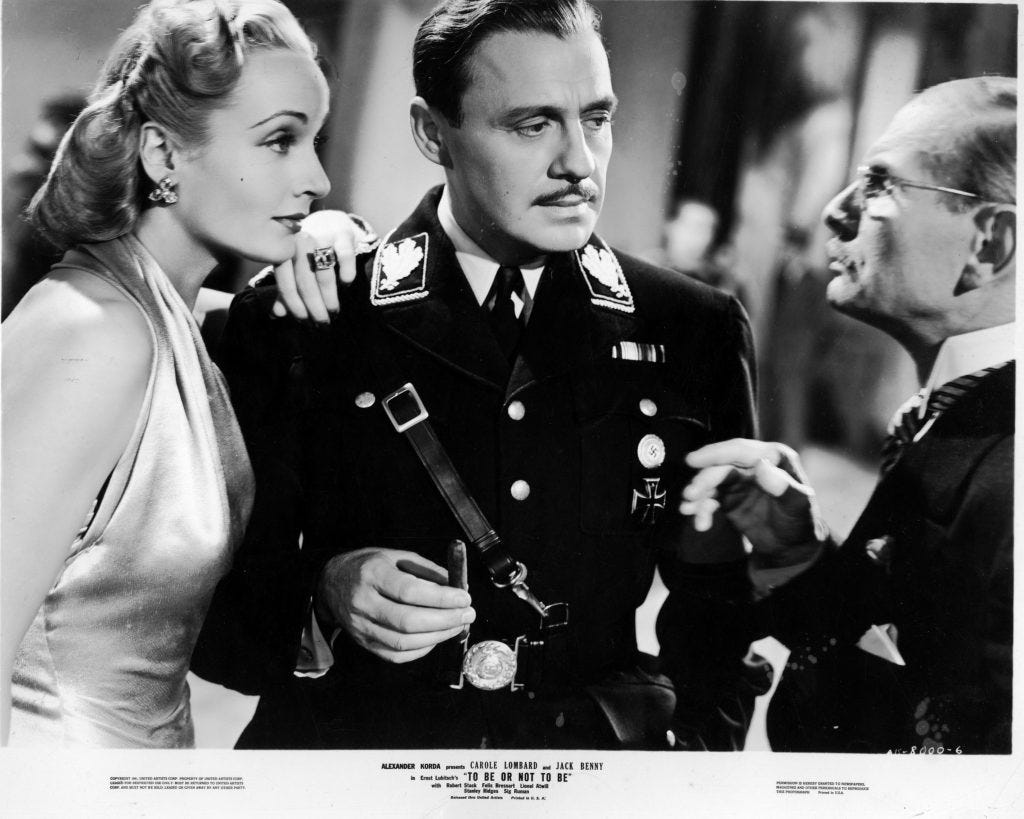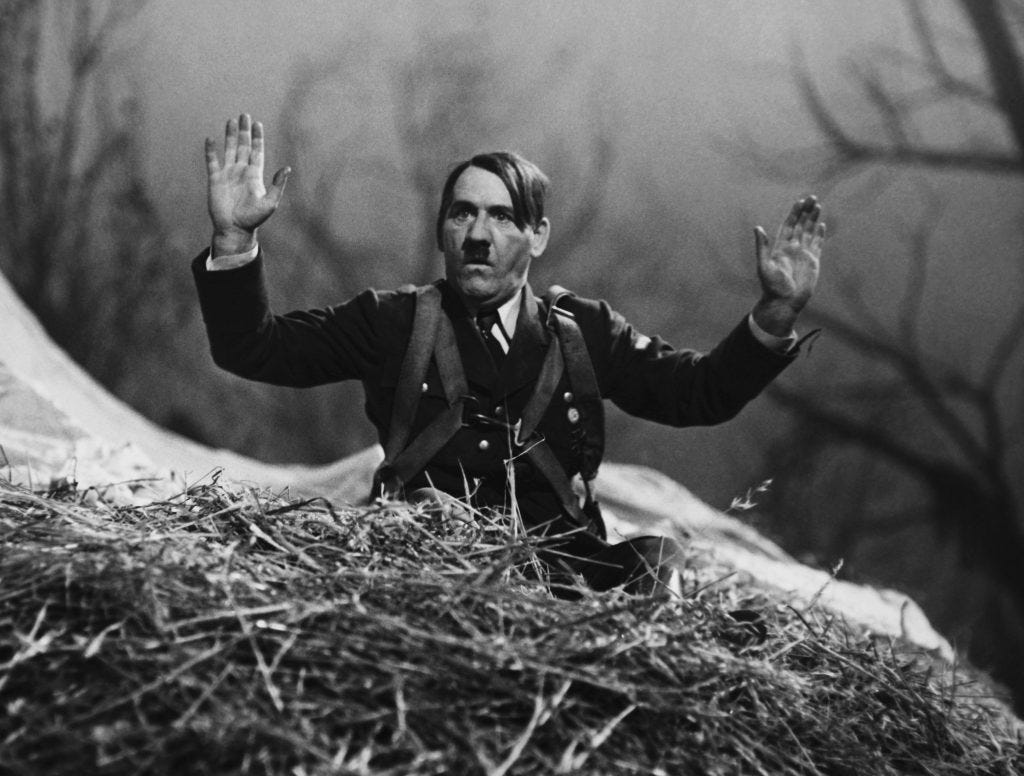The Lubitsch Touch Takes on Nazis
As we wrap up our Screwball comedies Journey, here’s a look at Ernst Lubitsch’s To Be or Not to Be.

Whenever I’m feeling really low, I reach for the Lubitsch. I suspect I’m not the only one who does this. From personal favorites such as Trouble in Paradise (1932), Design For Living (1933), and The Shop Around the Corner (1940), Lubitsch’s films never fail to bring a smile to my face, lifting my spirits and recharging my soul. After a pretty lousy few weeks, I revisited a favorite that I reserve for only the most desperate of times: Ernst Lubitsch’s 1942 comedy masterpiece To Be or Not to Be. With each viewing I’m left both with tears of laughter streaming down my face and scratching my head in a state of confused awe: How did Lubitsch manage to get this film made? In a world torn apart by war, with the ascension of fascists in positions of endless power, and the looming threat of Nazi Germany invading European countries, how on earth did Lubitsch convince Alexander Korda and United Artists to make this film? And how did he convince Jack Benny and Carole Lombard to star? It had to be that famous “Lubitsch touch.”
One of Ernst Lubitsch’s hallmarks was the timeliness of his comedic films. Although most of his films avoid overt political commentary, Lubitsch had a sense of what audiences needed to see and hear in relation to current events. One of the finest directors of the Depression-era, Lubitsch created much-needed escapism for American audiences. Distant European countries painted like rich fantasy worlds filled with expensive champagne, jewels, silk bias-cut gowns, custom suits, and stylish hats. Lubitsch carefully selected glamorous actors for these extravagant, continental settings and put their characters in utterly ridiculous situations. He pushed boundaries and playfully flouted convention, taking audiences a step outside their comfort zones. For the most part, audiences eagerly lost themselves in the fantasy, however, some critics and audiences found many of Lubitsch’s films to be far too risqué and in poor taste. (See the delightful Trouble in Paradise and Design For Living for a healthy dose of “ooh la la.”) As such, Lubitsch was no stranger to controversy; matter of fact, he gladly welcomed it.

Professor Siletsky: “Shall we drink to a blitzkrieg?”
Maria Tura: “I prefer a slow encirclement.”
Upon its release, To Be or Not to Be was harshly received by critics and audiences alike. Unlike Charlie Chaplin’s successful and highly-praised The Great Dictator (1940), which is often mentioned alongside To Be or Not to Be, many found the latter to be offensive and far too irreverent given the seriousness of Hitler and the Nazi threat to Europe and beyond. How could something so serious be reduced to a few running gags, fake beards and spirit gum, seduction, and Shakespeare? Even Jack Benny’s father walked out of a screening of the film, citing it disrespectful and vulgar. (Eventually he came around and loved the movie, seeing it countless times.) In response to a scathing review by film critic Bosley Crowther, Lubitsch penned the perfect response published in The New York Times:
“I am accused of three major sins: of having violated every traditional form in mixing melodrama with comedy-satire or even farce; of endangering our war effort in treating the Nazi menace too lightly; and of exhibiting extremely bad taste in having chosen present-day Warsaw as a background for comedy. One might call it a tragical farce or a farcical tragedy—I do not care and neither do the audience. The picture plays—and that’s the only important thing in this issue.”

Lubitsch knew what audiences wanted and needed to see, however uncomfortable, resulting in much of his work being ahead of its time, later greatly appreciated by critics, film scholars and diehard cinephiles. He knew that one of the most powerful tools against fascism and tyranny was satire, however irreverent it seemed. Dealing with profound loss, feelings of powerlessness and fear of the unknown is much easier if you can find a way to laugh. Witty commentary in all its forms, from farce to parody and satire, strips away the power from those who threaten us. Who knows if Ernst Lubitsch was aware that his films, specifically To Be or Not to Be, would hold such incredible significance some 80 years later; it doesn’t matter. Let us hold onto and protect these precious cinematic gifts from the past, calling on them often. We will need them. Let us also embrace and protect new art which channels the same ideals Lubitsch held so dear; they will serve as guideposts in challenging times.
“The picture plays—and that’s the only important thing.”

Great post!
“A laugh is nothing to be sneezed at!”
Great post!
“A laugh is nothing to be sneezed at!”